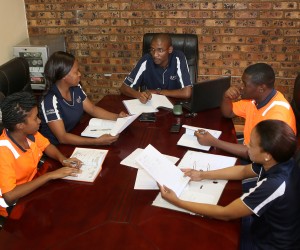Across South Africa there is an ever-increasing demand for young graduates entering the mining services industry to have both the educational skills and the practical experience that is required for them to be able to build careers and work effectively in this continually expanding and complex sector.
Talented candidates who have completed degrees and are looking to lay the right foundation for a long and successful career in South Africa’s mining industry will typically search for new ways to learn and be taught, which makes seeking experiential opportunities their main focus after graduating. “We have a generation of young people leaving university with a vision for success and they are aware that real time, hands-on experience is a must for their own personal growth and their career development plan,” explains Thamie Nyoni, HR Officer for Umzamo Analytical Services (UAS). “At UAS we know that this kind of training can also become a business’s best asset. However, through research and experience, we know that our local mining and mining services industry does not have enough experiential learning programs to answer the pressing needs of the student, nor the demands of the industry.”
Nyoni believes that for South Africa’s mining sector to flourish and to remain attractive in terms of career choice, graduate and internship programmes should be increased and that these programmes must be structured to create a rich learning environment with strong full time employment opportunities at the forefront. He goes on to explain how local firms can use sustainable internships to ensure that more efficient and experienced professionals enter the mining sector with a strong career foundation and a bright future.
1. Establish a Platform for Career Success
Instituting a structured graduate internship programme will help attract the best and brightest young individuals to your company. “Through internships, students develop work-based skills and their knowledge is enhanced through an experience that broadens their understanding of work as it applies to their area of study,” says Nyoni. At their laboratories in Witbank, Ermelo and Vryheid UAS have established an internship programme for graduates. At UAS Interns also develop professional associations because they are exposed to dealing with clients. This presents them with mentoring, ongoing support, and post-graduation job connections.
2. Recruit Selectively
Nyoni advises recruiting interns who are self-driven and goal oriented. Interview them and select the best, which, in his opinion are those who show the willingness to learn. “Interns bring new blood into an organisation, which means new ideas and innovativeness. Therefore as an organisation, we use that to our advantage by building up on their inexperience as opposed to hiring experienced individuals who may bring with them bad habits that may compromise our quality of service,” says Nyoni. As difficult and tedious a process as recruitment may be, Nyoni says that firms will see the fruits thereof in the long run.
3. Institute Meaningful Learning Programmes
Sustainable internships make getting hold of real business world experience more accessible to more students. It is important that companies have set procedures and structures in place to ensure that interns are learning something meaningful such as job specific tasks and dealing with clients. “UAS is committed to sustainable internships as opposed to a “flash in the pan” approach. In terms of responsibilities delegated to them during their time at UAS, we pair them with experienced individuals for them to be groomed in such a way that with time they can work on their own, with or without supervision,” says Nyoni.
4. Recognise and Reward Hard Work
Companies should make an effort to recognize and reward hard work among interns and entry level graduates. Higher salaries come as an incentive to interns who are pro-active, display proficiency across multiple disciplines and show a greater level of commitment to their work. “We value interns who come in and buy into our vision by providing uncompromised accurate analytical results that enable our clients to make financially sound decisions and show value added support to our clients in extracting the maximum value from their products. More so, we ensure that interns are made feel at home by instilling our corporate culture in them.”
Nyoni concludes by encouraging firms to try internship programmes even if they have not had done so in the past. “If in the past, organizational complexity and the unknown have been a deterrent for you in your decision to host an internship program at your organisation, you may find that interns can contribute significantly to your daily activities. It seems that more firms engage on an educational level by donating money for bursaries but students need assistance after graduating as well – especially given the current job market.
One is not enough without the other. Education and experience; there is a reason they are the first two titles on a resume.”
UAS Internship Case Study
George Matabane and Shirley Mbazima were recruited as interns at UAS in November 2014 to work as Laboratory technicians. At the time they both had no prior working experience in the coal mining industry. Through their hard work they learnt everything from coal sampling, preparation and testing to the ISO/ASTM standards that need to be adhered to at an accredited coal testing laboratory. They both rose through the ranks of the company with George Matabane eventually being promoted to the position of Site Supervisor for UAS’ Vryheid onsite lab run on behalf of Keaton Energy and Shirley Mbazima being promoted to Process Coordinator. Shirley now handles projects for the likes of ESKOM and JUST Coal. Both Shirley and George are still employed at UAS today.






